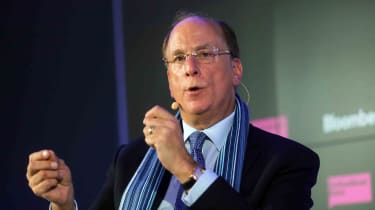BlackRock (BLK), the world’s largest investment firm, published on Tuesday the much-anticipated annual Letter to CEOs from its own chief, Larry Fink.
Over the past decade, these letters have increasingly urged companies to recognize and manage environmental, social, and governance (ESG) risks and opportunities.
Fink’s tone this year is insistent, recognizing that the pandemic has “turbocharged” the move to “stakeholder capitalism,” or how companies relate to employees, customers, the environment, and society.
“Stakeholder capitalism is not about politics,” Fink writes. “It is not a social or ideological agenda. It is not ‘woke.’ It is capitalism.”
Information Revolution Gives Way to Decarbonization RevolutionChief among these ESG opportunities is the move away from an economic system that consumes fossil fuels and emits large volumes of greenhouse gases, also known as “decarbonization.” Writes Fink:
“Engineers and scientists are working around the clock on how to decarbonize cement, steel, and plastics; shipping, trucking, and aviation; agriculture, energy, and construction. I believe the decarbonizing of the global economy is going to create the greatest investment opportunity of our lifetime. … The next 1,000 unicorns won’t be search engines or social media companies, they’ll be sustainable, scalable innovators – startups that help the world decarbonize and make the energy transition affordable for all consumers.”
Fink clarifies that for investors, this decarbonization may extend to the portfolio level, contributing to the massive growth in sustainable investments.
The old model of employee management? “That world is gone.”Given the “great resignation” of 2021 and the attendant focus on employee mental health, a fair wage for lower-income employees, and the work-from-home trend, companies must radically rethink internal management.
“Our research shows that companies who forged strong bonds with their employees have seen lower levels of turnover and higher returns through the pandemic,” Fink says.
And those companies that ignore worker concerns face real business risk.
“Turnover drives up expenses, drives down productivity, and erodes culture and corporate memory.”
Stepping up shareholder engagement and proxy votingUntil recently, BlackRock avoided or even blocked efforts by other investors to pressure companies to operate more sustainably, by actively voting with management and against sustainable investors for specific recommendations, such as better disclosures on climate change risk.
BlackRock was itself targeted for this obstructionist behavior in a shareholder resolution filed by investors in 2020, and later withdrawn when BlackRock agreed to change its proxy voting practices.
And change they did; the CEO Letter affirms proxy voting as a shareholder right. Like other firms, BlackRock allows some large clients, such as pension funds, to dictate how proxies should be voted, but this ability will be extended to the individual investor once technical and regulatory logistics are sorted.
It should be noted, however, that all of BlackRock’s efforts on shareholder proposals to date are reactive; the firm does not file such proposals itself but merely votes on those created and managed by other investors, typically those active in the U.S. Forum for Sustainable and Responsible Investment.
Recognizing the growing interest in better research, advocacy and data related to ESG investing, BlackRock is also launching a Center for Stakeholder Capitalism to “further explore the relationships between companies and their stakeholders and between stakeholder engagement and shareholder value.”
